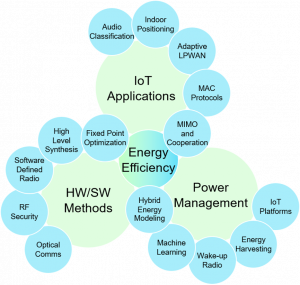General purpose wireless devices as smartphones already have to carry more and more data while keeping their autonomy as long as possible, but the next challenge they will face is the ubiquity of users. This ability to be connected everywhere in a continuous and transparent way, keeping the same quality of services whatever the environment, implies that devices can deal with different wireless standards, furthermore choosing for each of them the most energy efficient configuration. In this connected world, even the smallest sensors will be able to send their data over what is called Internet of Things (IoT), such that every user in the world could reach it. The problem that designers will face is then the autonomy of such sensors, since radio is very energy consuming, and obviously, the more sensors we place, the less we want to change batteries.In such a context, the GRANIT team purpose is to design algorithms and architectures able to adapt to environment parameters, such as propagation channel characteristics, wireless traffic conditions or network topology while respecting applications requirements in terms of data rate, reliability, latency, and most of all, life time of involved systems, etc. The GRANIT members have a strong experience on wireless sensor network (WSN) protocols (MAC and PHY layers) and hardware architectures, and developed several WSN platforms and demonstrators for various areas monitoring applications or dedicated to human body.
As energy can now be scavenged from the direct environment of sensor nodes (light, heat, vibrations, etc.), a harvesting board can be added to WSN platforms. One of the objectives of the GRANIT team is then to design power management strategies, coupled to above-mentioned adaptive algorithms in order to reach real energy autonomy of the sensor nodes. Cooperation between nodes, either through distributed computing to find the best radio / computation trade-off or through the choice of the best cooperative relaying schemes, represents also a key challenge for the design of energy-efficient wireless systems. The GRANIT team will continue to investigate this very promising field at both physical and medium access layers.
Last but not least, the aim of GRANIT team is also to efficiently implement these algorithms to different targets, from low power microcontrollers and/or low power FPGAs for WSN solutions to powerful system-on-chip and multi-core systems for more computing-intensive applications. To answer the demand of agile devices, software defined radio solutions (SDR) will especially be considered, not only for high data-rate mobile standards such as 5G, but also for wireless sensor networks, enabling testbeds for low power adaptive and/or cooperative solutions. In addition to analytical derivations and simulations, the GRANIT team indeed clearly aims at using platforms to evaluate our research performance, but also to reach what could be called a platform-based design, meaning that the constraints of the envisaged platforms are taken into account very soon in the design process.




